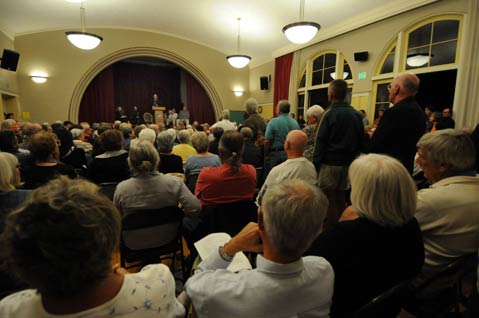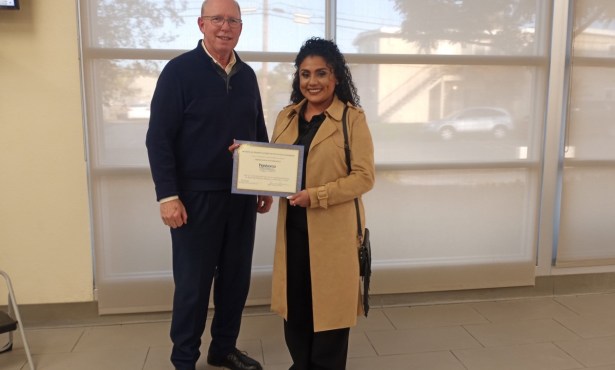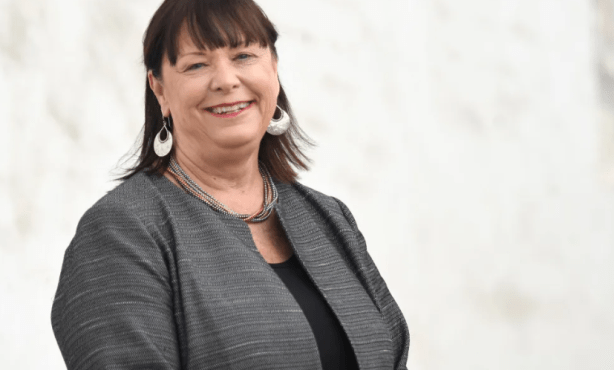Student Uprising
City College Adult Education Forum Answers Questions and Raises Hell

There has been a palpable buzz in the community recently about cuts to Santa Barbara City College’s monstrously popular Adult Education Program and, on Tuesday night, that buzz became a mob. With approximately 100 classes cut seemingly overnight from the Continuing Education program’s course catalog-which is roughly 13 percent of its offerings-just before fall registration, and rumors running wild about further cuts for the upcoming winter quarter, hundreds of students and instructors flooded a Continuing Education Community Forum hosted by SBCC administrators at the Schott Center’s auditorium this week to ask questions and demand answers. And, with school President Andreea Serban and Adult Education Vice President Dr. Ofelia Arellano on hand, that is exactly what they got.
In a generally civil, often appreciative, and occasionally heated two-hour discussion on the subject-presided over by the Fund for Santa Barbara’s Geoff Green-a standing-room-only crowd got the SBCC-specific lowdown on the state budget nightmare responsible for cuts at public schools throughout California. According to Serban, in the past two years SBCC has endured just under $10 million in budget cuts (about $900,000 of that coming from Adult Education’s operating budget) due to reductions in state funding, which accounts for 90 percent of the school’s cash flow. Further, since the state often doesn’t figure out its budget until well past the planning point for fall course offerings, the result-much like what transpired this past August-is some serious last-minute scrambling by administrators to craft a final course list that they can actually afford to implement. The harsh realities of that last-minute scramble caught many of the roughly 20,000 adults who use continuing education classes at SBCC each year to further their careers and enrich their lives, as well as the hundreds of instructors who teach them, off guard. It even affected the printed version of the fall-quarter course catalog, as dozens of class sections were listed despite the fact that they were not available once online registration commenced in late August.
Compounding the budget problem-and perhaps at the root of the opinion held by many teachers and students that the administration did a lousy job of informing them of the imminent cuts-is the recent turnover of four Adult Ed administrative positions. Due to retirements, the positions of the vice president, dean, and two program director jobs have all turned over in the past year, said Serban. “At the end of the day, it is important to understand that these are not usual times.” opined the college’s president.
During the evening’s Q&A portion, students -many of them of retirement age-offered testimonials about the importance of Adult Ed classes in everything from combating depression and providing physical therapy to offering the only affordable path to an education and opening new professional doors. As Petale McDowell, a geriatric social worker who has taken nearly 30 courses, put it, “This isn’t a luxury for us. It is a necessity.” Further, many in the audience expressed outrage about SBCC administrators’ unwillingness to take pay cuts-a stance that Serban, in an unpopular move, defended by saying it is the school’s intention to “not impact our permanent employees.”
As for the upcoming quarter, Adult Ed’s Arellano promised on Tuesday that “a majority of the courses that were cancelled will be reinstated.” And, while she declined to give specific course names, she did say 604 classes would be on offer for the winter quarter versus the 572 available during fall. The reason behind the change is a cost-cutting decision by administrators to shorten the quarter from 10 to eight weeks, to not offer chronically under-enrolled classes (though it should be noted that, due to new state mandates, the minimum number of students required for a class to be funded is now 20 rather than 17), and to simply delete courses taught by retiring teachers. Further out, Arellano says the school is exploring fundraising and grant options as well as working to determine which courses could be offered as fee-based classes thus circumventing the state funding process.
According to officials, the school is planning an additional forum on the subject sometime next month, though the date has yet to be determined.



